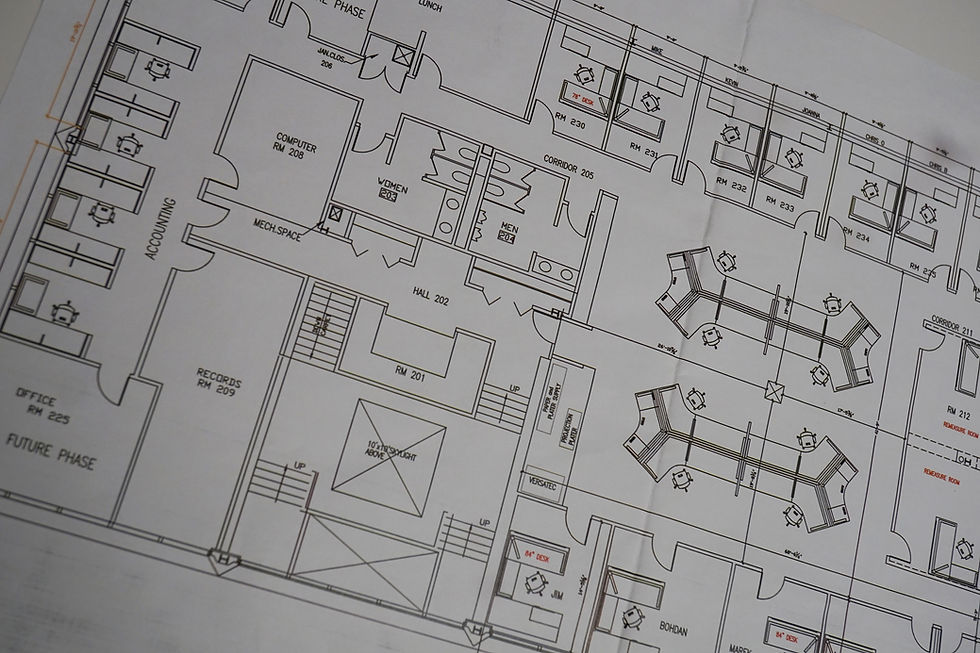How Will COVID-19 Affect our Industry Long-Term?
- Wal-Tek Team

- Mar 24, 2020
- 3 min read
The contract furniture industry is essential to companies looking to stay on top of the everchanging landscape of their work environments. The industry is no stranger to trends among office design that are based off of business demands, common practices, ergonomics, generational preferences, etc. Our partnered dealerships stay ahead of these trends, and even influence them, to create competitive advantages to help distinguish themselves from competitors.
One of the recent movements we have seen is the shift from high office cubicles and private offices meant to isolate workers to community-based workplaces with meeting tables and open floor plans conducive to group work and connectiveness. Another trend affecting our industry is the increase in working remotely and downsizing the brick and mortar offices.
Open floor plans have grown immensely throughout our industry. "By 2014, about 70 percent of all offices reportedly had open floors plans" (Aytekin Tank, Entrepreneur). They grew in popularity around the start-up era for several reasons. The biggest reason was capital; these companies did not want to spend thousands of dollars on overhead like new office furniture, nor could they afford large office spaces. These start-ups needed to maximize space by utilizing as many employees in one space as possible.
The popular conception was that open floor plans created intense collaboration among team members. With no privacy or barriers, employees are freely able to collaborate with each other. There remains a constant push and pull as to whether or not this collaboration is effective in the workplace. Employees complain about noise and distractions. As a result, we are now seeing an increase in pods,
phone booths, etc. Private pods allow employees to talk on the phone without affecting their coworkers and/or provide a quiet space to work privately. This is an example of how our industry adapts to the demands of the workplace.
Remote work has increased among U.S. workers over the years. "Between 2005 to 2017, there was a 159% increase in remote work" (Beth Braccio, Flex Jobs). With technology always evolving, it is not
surprising that remote work has been more effective and simpler to implement. Meetings no longer need to be in person but implemented through technological means. Collaboration on group projects no longer needs to be in a huddle room but done over a shared document in real-time.
With the now unknown depths of the outreach and effects of the COVID-19 Virus, the Wal-Tek Team asks the question: What is next for our industry? This is new and unchartered territory. Remote work has been mandated by executive order from municipalities and governments. It has forced companies to test their technology infrastructure to allow employees to work remotely. The question at hand becomes: Will this influence company executives to embrace this work model permanently? Do the benefits of a remote workforce outweigh the traditional office space? If remote work creates better results, happier employees, and a decrease in overhead, what does that look like for the contract furniture industry?
Self-isolation and social distancing are mandated and necessary in the interim to avoid the spread of the virus. Will this in turn set off fear returning to work for both employee and employer? Employees need to work and employers need labor. The spread of illness in the workplace affects the bottom line. Will private offices and isolating cubicles once again come into favor? Perhaps, we will see new designs providing the illusion of collaboration and openness but with innovative built-in protection to prevent the spread of airborne illnesses.
This trend in remote work may show a demand for creative design in home offices and coworking spaces. Perhaps a niche in small office spaces and furniture pieces that serve multiple purposes will develop. Employers may offer incentives and budgets for their employees to set up home offices. Some employees may prefer to work remotely but not in their home. That will increase demands for co-working spaces. These are topics important for our industry peers to discuss because they will have an immense impact on what we are offering our customers. What is next and are we ready for it?
Best wishes and health to you and your families during these unprecedented times
- The Wal-Tek Team






Comments